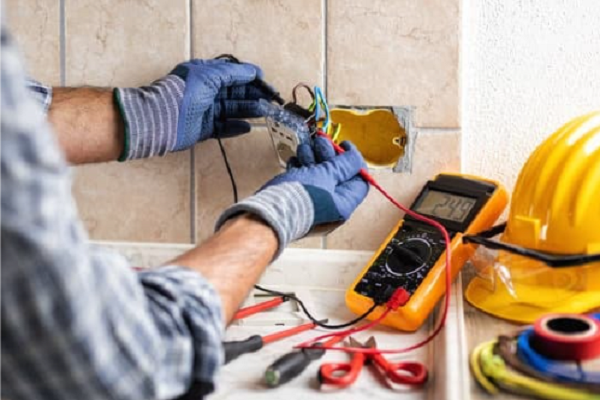Living near Australia’s stunning coastline offers a unique lifestyle filled with picturesque views, fresh sea breezes, and the calming sound of waves. However, coastal homes face environmental challenges that can pose risks to your electrical system. The combination of salt-laden air, high humidity, and frequent storms creates the perfect conditions for corrosion and electrical hazards.
Taking proactive measures to ensure your electrical system is safe and reliable is essential for protecting your home and family. Let’s explore the most critical electrical safety tips tailored for coastal properties.
1. Recognize the Effects of Salt and Moisture on Electrical Systems
Salt in the coastal air is corrosive and accelerates the deterioration of metals, including those in wiring, outlets, and fixtures. Moisture, combined with salt, seeps into electrical components and increases the likelihood of short circuits or malfunctions.
Steps to Mitigate Corrosion and Moisture Damage:
- Opt for corrosion-resistant materials: Use stainless steel for fixtures and protective enclosures.
- Apply anti-corrosion coatings: Treat outdoor electrical components with protective coatings to shield them from salt exposure.
- Schedule annual inspections: Work with a licensed electrician to identify and address corrosion early.
2. Invest in Whole-House Surge Protection
Coastal storms often lead to sudden power surges that can damage your appliances and electronic devices. Installing a surge protection system can save you costly repairs or replacements.
How to Protect Your Home:
- Install a whole-house surge protector: Connect it to your main electrical panel to guard your entire system.
- Use individual surge protectors: Place these on high-value electronics such as televisions, computers, and gaming consoles for added security.
- Monitor your system: Ensure surge protectors are functioning properly and replace older ones if needed.
3. Prioritize Proper Grounding
Electrical grounding is critical for safety in any home, but coastal environments require extra attention due to increased moisture. Proper grounding prevents electric shocks and minimizes the risk of electrical fires.
Key Recommendations:
- Inspect grounding systems regularly: Ensure all electrical circuits are properly grounded and meet Australian standards.
- Upgrade older homes: If your coastal property is older, consult an electrician to update its grounding systems.
4. Weatherproof Your Electrical Installations
Outdoor electrical components in coastal areas are particularly vulnerable to damage from wind, rain, and salt spray. Protecting these elements is vital to maintaining safety and functionality.
How to Safeguard Outdoor Systems:
- Install weatherproof outlets: Use durable covers to protect outdoor plugs from the elements.
- Ensure watertight seals: Inspect all seals around outdoor fixtures and replace them if they’re damaged or worn.
- Choose outdoor-rated appliances and fixtures: Use only equipment designed for outdoor use, such as lighting and power points.
5. Keep Electrical Wiring and Connections Dry
Moisture infiltration is a common issue in coastal homes and can lead to serious electrical hazards, including short circuits and fires.
Maintenance Practices to Follow:
- Inspect wiring for wear and tear: Replace any damaged or exposed wires promptly.
- Use conduit pipes: Run wiring through weatherproof conduits to prevent moisture intrusion.
- Avoid overloading circuits: Overloaded circuits can overheat, particularly in damp conditions.
6. Install and Maintain Residual Current Devices (RCDs)
Residual Current Devices (RCDs), also known as safety switches, are a crucial safeguard against electric shocks and faults. They instantly cut power when a problem is detected.
Best Practices:
- Ensure comprehensive coverage: Every circuit in your home should be protected by an RCD.
- Test RCDs regularly: Use the “test” button to ensure they’re functioning properly; monthly testing is recommended.
- Upgrade older systems: If your home’s electrical panel lacks RCDs, consult an electrician to install them.
7. Manage Vegetation Around Power Lines
Coastal storms can cause trees and branches to fall onto power lines, resulting in outages or electrical hazards. Regularly managing vegetation around your property reduces this risk.
Safety Tips for Tree Maintenance:
- Trim trees regularly: Keep branches at a safe distance from overhead power lines.
- Hire professionals: For large or hard-to-reach trees, enlist the help of certified arborists.
8. Conduct Regular Electrical Inspections
Routine inspections are an essential step in identifying potential issues before they escalate. Licensed electricians are equipped to detect problems caused by salt, moisture, or general wear and tear in coastal environments.
Why Inspections Matter:
- Catch problems early: Addressing minor issues prevents costly repairs or hazards.
- Ensure compliance: Regular checks ensure your electrical systems meet Australian safety standards.
9. Use High-Quality Outdoor Lighting
Outdoor lighting is a staple for coastal homes, but it requires careful selection to withstand the harsh environment. Choosing high-quality fixtures reduces maintenance needs and enhances safety.
What to Look For:
- Marine-grade fixtures: These are specifically designed to resist corrosion in salty environments.
- LED lights: Energy-efficient and long-lasting, LEDs are ideal for coastal areas.
- Regular cleaning: Keep fixtures free of salt buildup to maintain performance.
10. Work with Licensed Electricians
While DIY electrical work might seem like a way to save money, it’s not worth the risk in coastal homes. Licensed electricians understand the unique challenges of coastal environments and provide expert solutions tailored to your needs.
Why Choose Professional Help:
- Expertise in coastal systems: Electricians can recommend corrosion-resistant materials and proper installation methods.
- Peace of mind: Professional work ensures safety and compliance with local regulations.
👉 Contact our team of licensed electricians today to schedule a consultation and protect your home from coastal hazards.
Ensure Long-Term Electrical Safety for Your Coastal Home
Living by the coast provides unparalleled beauty and tranquility, but it also comes with unique challenges for maintaining your home. From addressing the impact of salt and moisture to implementing surge protection and weatherproofing, these electrical safety tips are essential for safeguarding your property.
If you’re unsure about the condition of your home’s electrical system or need professional guidance, don’t hesitate to reach out to us. Let us help you create a safe, reliable, and resilient environment for you and your loved ones.


 Your Local Reliable Electrician That You Can Trust
Your Local Reliable Electrician That You Can Trust 